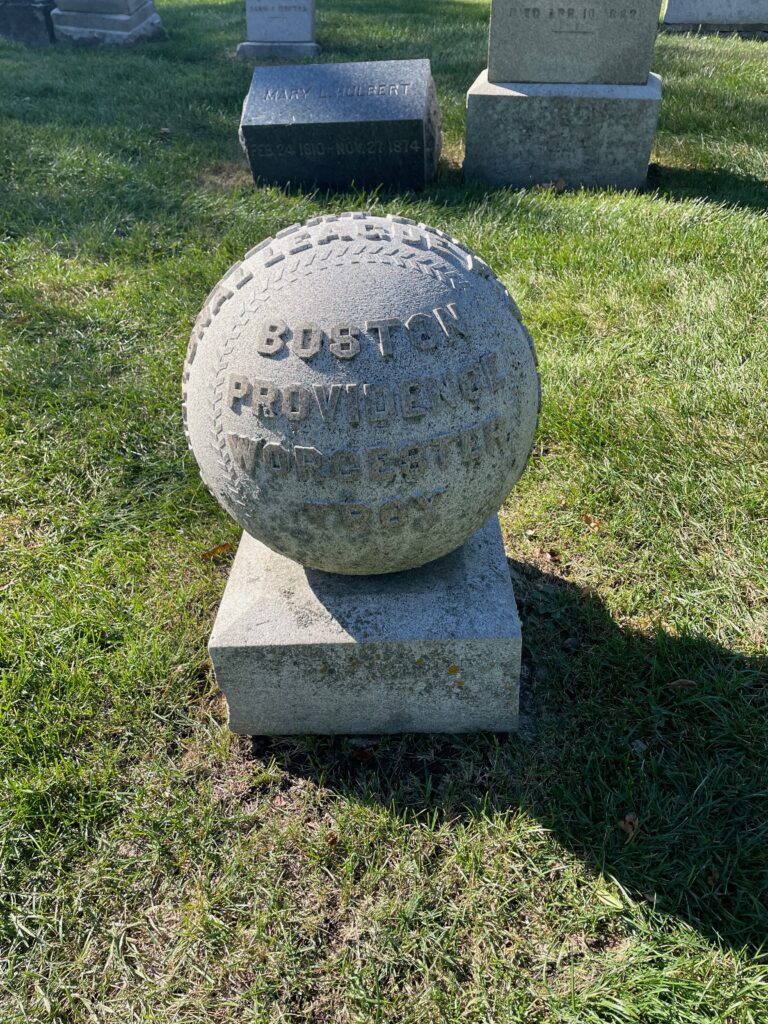Erik Visits an American Grave, Part 1,798
This is the grave of William Hulbert.



Born in Burlington Flats, New York in 1832, Hulbert grew up in Chicago. His family moved to the new city on Lake Michigan in 1834 and he lived there the rest of his life, outside of going to Beloit College in Wisconsin. He married well, the daughter of a successful grocer. His father in law took into the business and he expanded it, getting involved in the coal trade and doing well. He made a good bit of money.
Hulbert wanted to have fun with his money and he loved the new game of baseball. So that’s pretty much his whole life. He wanted to promote baseball. In 1871, he helped start a new team for the National Association–the Chicago White Stockings. The Great Chicago Fire delayed the team from getting off the ground and after its initial season, it took the next two years off. But in 1874, the White Sox were back and by this time basically run from Hulbert. He wanted to professionalize the game, which from his perspective–and this was very Gilded Age–cracking down on labor. See, the White Stockings shortstop, Davy Force (what a name!), was notorious in baseball circles for contract jumping, leaving a team in search of a better deal. To men like Hulbert, this was a crime. See, these Gilded Age guys, they believed in the contract like it was the Bible. Often more than the Bible. The contract was a law from God. That’s why for a lot of them, when they freed slaves and then had now freedpeople sign exploitative labor contracts with their old slavers for a year at a time, well that was good enough in terms of rights. The contract could do no wrong! It can’t fail, it can only be failed, to use the parlance of our times. So Hulbert had already broken league rules by signing Force to a contract for the 1875 season before the 1874 season had ended. But then, Force signed another contract after the season with the Philadelphia Athletics. Hulbert was furious. He believed that this was a crime. He also believed the eastern clubs with their big money were conspiring to keep western clubs like his down. He then went to war with the Boston Red Stockings, trying to sign all their players.
The point is that Hulbert saw the need for some rationality in the system. This war could tear apart baseball. So in 1876, with Hulbert representing a consortium of western teams, he met with the owners of some of the eastern teams. They agreed to new rules and to form a league. This is the National League. It still exists today. Being a puritan as much as he was a contract fetishist, Hulbert pushed a bunch of fun rules for the NL–no playing on Sunday, no alcohol served in the stadium, no gambling. It also limited teams to cities with over 75,000 residents and gave the current clubs exclusive territorial rights. Morgan Bulkeley, the owner of the Hartford Dark Blues, was named the first president because he drew the short straw (literally, this is how they decided it), but he was totally disinterested. He didn’t show up for the 1877 NL meetings, and everyone agreed Hulbert should just take it over. It was his baby anyway.
Hulbert ruled the National League for the next five years, with an emphasis on ruling, as he was more than a bit of a dictator. The first thing he did was kick out the New York and Philadelphia teams. They had not completed their schedules as promised, Hulbert considered this unprofessional, and, well, seems pretty reasonable to me. He thus took over scheduling, centralizing it and making it professional. Then in 1877, four players on the Louisville Grays threw the pennant. Hulbert banned them from the league. That banning and subsequent prosecutions of gambling players led to the folding of the teams of Louisville, St. Louis, and Hartford. He replaced them with smaller market teams in Providence, Indianapolis, Milwaukee, and Syracuse. Hulbert then went after high salaries. The top three players for the Cincinnati Reds made more than the rest of the team combined. Suddenly, Hulbert’s contract fetish disappeared and eliminated the ability of players to negotiate their own salaries. The Reds also rejected the NL’s ban on Sunday games and beer–this was a German town after all–so in 1881, the puritanical Hulbert had the NL create harsher rules on the subject and then expelled the Reds for violating it before the rule even went into effect! The Reds responded by creating the American Association and challenging the NL.
Hulbert would have went on being a total dictator for as long as he could, even if it destroyed the National League, which given his ardor for evicting teams might have happened, but he died of a heart attack in 1882, at the age of 49.
Hulbert was not inducted into the Baseball Hall of Fame until 1995. When the Hall of Fame inducted American League president Ban Johnson in 1937, it decided it should bring an early NL guy in as well but chose Morgan Bulkeley, the Hartford owner who had indifferently been first president. No one paid much attention for decades and then someone realized that Bulkeley had done absolutely nothing and finally the Hall inducted Hulbert nearly sixty years later.
William Hulbert is buried–and what a gravestone!–in Graceland Cemetery, Chicago, Illinois.
If you would like this series to visit other baseball executives in the Hall of Fame, you can donate to cover the required expenses here. Ban Johnson is in Spencer, Indiana and Morgan Bulkeley is in Hartford, Connecticut. Previous posts in this series are archived here and here.


